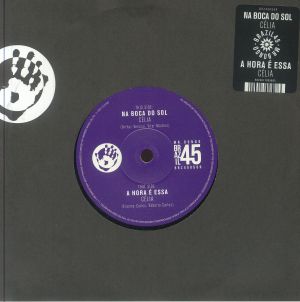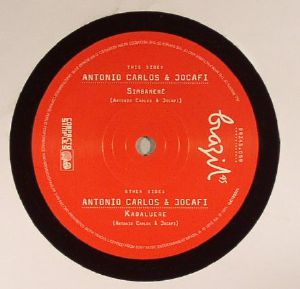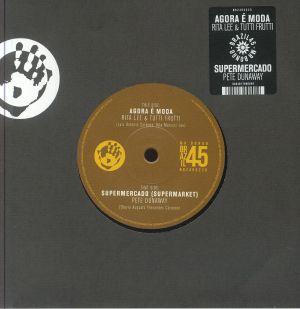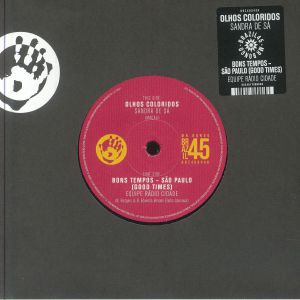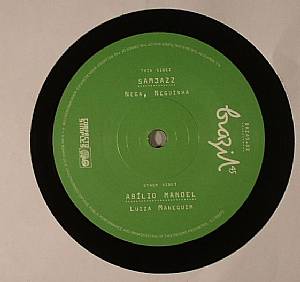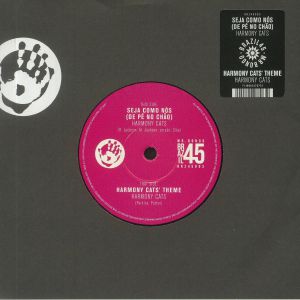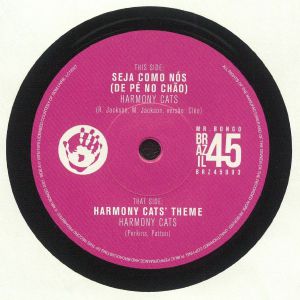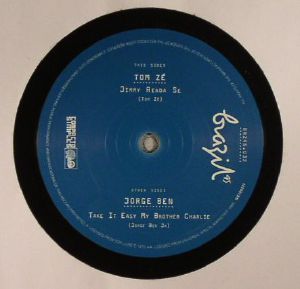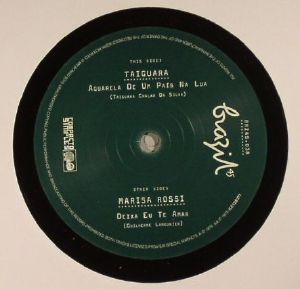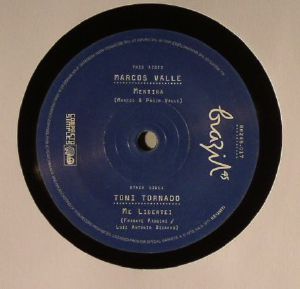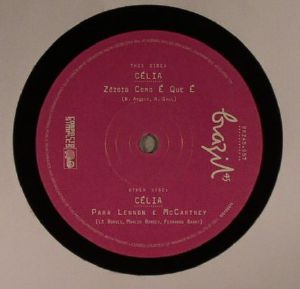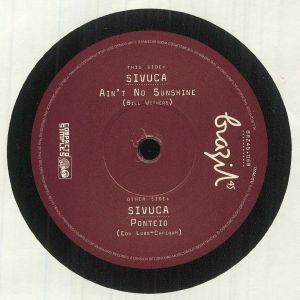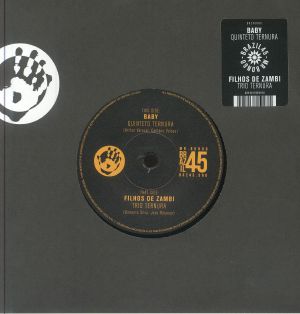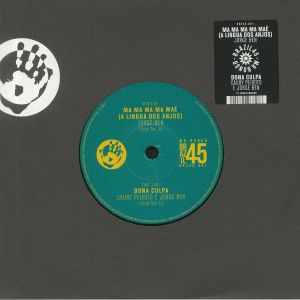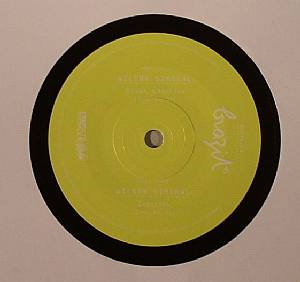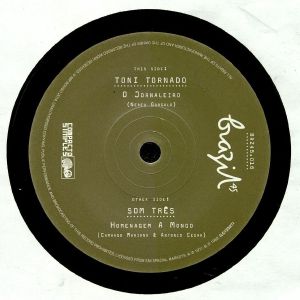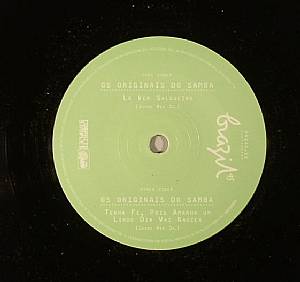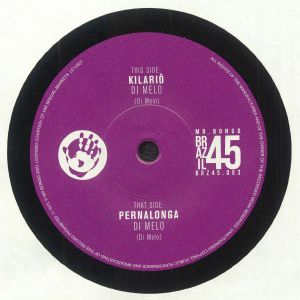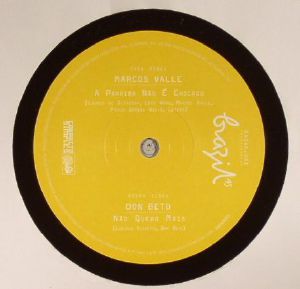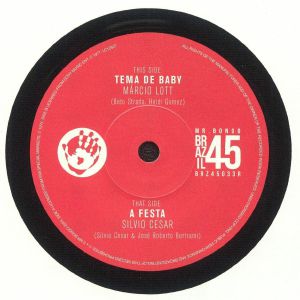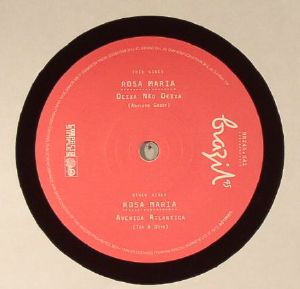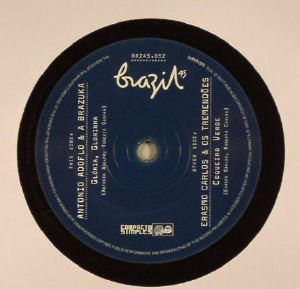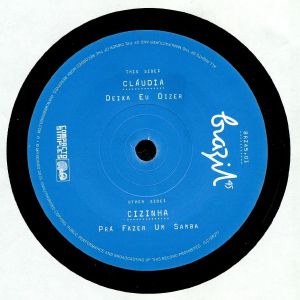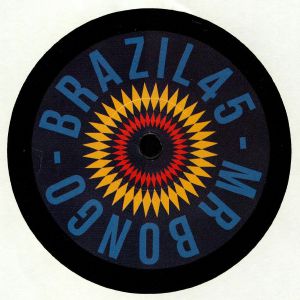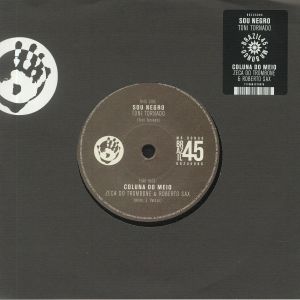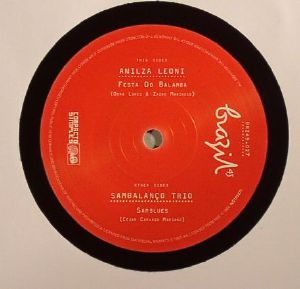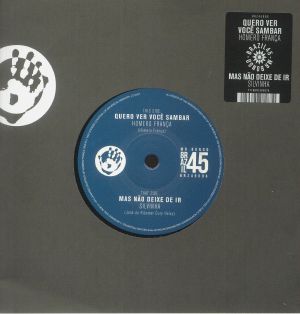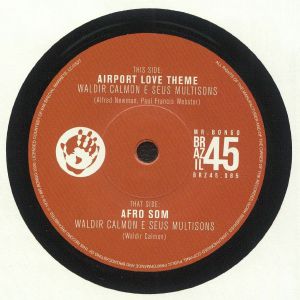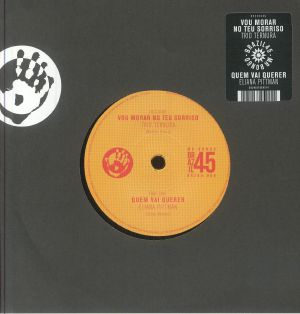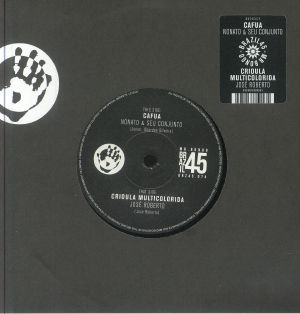Filter
Type
Music
Format
Featured
Release Title
Price
Tags
All genres charts
Bestselling All genres vinyl
Artikel 1 bis 32 von 32 auf Seite 1 von 1 anzeigen
Cat: BRZ 45041R. Rel: 04 Mar 25
International
Review: The wonderful Brazil 45 series from Mr Bongo is back with its big old torch to shine a beam of deserving attention on two standout funk and bossa nova tracks from Rosa Maria, which originally came in 1972 and have remained in demand ever since. The A-side, 'Deixa Nao Deixa', blends Afro-Latin guitar, wild horns and percussion with infectious vocal harmonies that all coalesce into a Brazilian funk classic. On the B-side, 'Avenida Atlantica' delivers alternating funk and bossa beats beneath layers of vocals, horns and percussion to bring big energy and dancefloor-ready heat. This reissue ensures these timeless tracks become available for your rotation once more.
… Read moreGespielt von: ISOUL8 (Volcov)
in stock $12.48
in stock $12.48
Review: Mr Bongo's Brazil 45's series brings us two Brazilian classics: Rita Lee & Tutti Frutti's 'Agora E Moda' and Pete Dunaway's 'Supermarket'. 'Agora E Moda' from Lee's 1978 album Babilonia is a psychedelic disco-boogie groove highlighted by squelching guitar licks, funk drums, and cosmic vocals. Rita Lee, the former lead singer of Os Mutantes and a key figure in the Tropicalia movement, left a lasting legacy upon her passing in 2023. On the flip side, Dunaway's 'Supermarket' is a rare groove/AOR gem with a standout bassline, swaggering guitar, and lush strings, showcasing his talent as a composer and multi-instrumentalist. This release celebrates the enduring influence of Brazilian music.
… Read moreGespielt von: Juno Recommends Disco
in stock $10.82
Review: Sandra de Sa's 'Olhos Coloridos' and Equipe Radio Cidade's 'Bons Tempos Sao Paulo' bring vibrant Brazilian boogie back to life in this remastered reissue from Mr Bongo's Brazil 45's series. Sandra de Sa's track, from her 1982 self-titled LP, is a brilliant example of '80s MPB and boogie, featuring the iconic collaboration of Lincoln Olivetti, Robson Jorge, and members from Banda Black Rio. Funky basslines, dreamy Rhodes and jubilant horns complement Sa's outstanding vocals, making it a joyous, danceable piece reminiscent of Tim Maia and Marcos Valle's best. On Side-2, Equipe Radio Cidade's 'Bons Tempos Sao Paulo' transforms Chic's 'Good Times' into a Brazilian boogie delight. Originally a rare promo-only release from 1980, this version infuses the classic melody with samba rhythms, clavinet grooves, and cuica percussion breaks. Voiced by Sao Paulo radio DJs with festive greetings, it adds a unique local flavour to the familiar tune, reminiscent of the era's vibrant Brazilian music scene.
… Read moreGespielt von: Juno Recommends Disco
in stock $10.82
in stock $12.48
Cat: BRZ 45093. Rel: 12 Aug 21
International
Review: There have now been almost 100 hundred entries on Mr Bongo's Brazil 45 series and as far as we can tell not one of them has been a dud. This time they opt for a big and airy soul sound from The Harmony Cats. They were an all female vocal quintet that hailed from Sao Paulo and banded together in 1976. Most prolific in the disco days, the b-side here is their best known tune outside of Brazil. It's got a cosmic breakbeat and light vocals that soar to the skies. A-side 'Seja Como Nos (De Pe No Chao)' is a just as sweet sound that transports you to Latin America in an instant.
… Read more in stock $12.48
Cat: BRZ45 093NB. Rel: 01 Nov 24
International
Review: The Brazil45 series has always been pure gold and now come a pair f beauties from Harmony Cats, a vocal quintet-turned-trio from Sao Paulo known for their disco-era hits. Harmony Cats' 'Theme' from 1976 is their most recognised track outside Brazil and is inspired by Rhythm Heritage's Barretta's Theme with its spacey breakbeats, lush vocals and percussive flair, all of which have made it a true crossover classic. On the B-side, 'Seja Como Nos (De Pe No Chao)' delivers an exuberant Brazilian twist on The Jacksons' 'Shake Your Body (Down to the Ground)'- it's a guaranteed floor-filler with radiant disco energy and Harmony Cats' signature vocal style.
… Read moreGespielt von: Juno Recommends International
in stock $10.82
Review: Mr Bongo's Brazil 45s series gets its rock on with two hairy grooves, both of which have enjoyed the sampler's crafty knives over the years. First up, Tom Ze's "Jimmy Renda-se" rolls with an oily sleazy groove that's peppered by a playful lyrical rhythm that transcends language barriers. Ben's "Take It Easy My Brother Charlie" joins the dots between Samba and very light Rock with all the signatures that made Mr Ben the legend he remains to this day with big vocal harmonies and infectious textures of Brazilian percussion.
… Read moreGespielt von: Mukatsuku Records Chart, Smoove, Hubbz, Afro Beat Foundation, JKriv (Razor-N-Tape), I Love 45's!
in stock $12.48
in stock $12.48
Review: Mr Bongo's Brazil 45s series continues its consistently rich vein of form with two more beautifully contrasting - and previously difficult to track down - Brazilian soul jazz fusions from the 70s. Side A is inhabited by one of the era's most interesting individuals. Infamously censored and eventually exiled, Taiguara's chaotic flute, guitar and piano arrangement is a tight weave of melodies, counter melodies and start dynamics. Flip for the classically soul-oriented "Deixa Eu Te Amar" will bright horns, brash drums and a bold vocal from Marisa Rossi. Pow.
… Read moreGespielt von: Afro Beat Foundation, The Expansions
in stock $12.48
Review: Two premium Latin funk documents on one limited 45, Mr Bongo deliver once again: Marcos Valle needs no introduction to Brazilian music enthusiasts. "Mentira" is a self-cover as Valle takes his 69 classic "Mentira Carioca" and develops the dynamic with a vocal style that's highly reminiscent of Donovan. Flip for Toni Tornado's Black Rio anthem "Me Libertei". Fusing sleazy rock n roll with jazzy Latin soul, madly this is the first time it's ever graced a 45!
… Read more in stock $12.48
Gespielt von: JimmyTheTwin, Far Out Recordings
in stock $10.54
Cat: BRZ45 01R. Rel: 22 Nov 24
International
Review: 'Deixa Eu Dizer' is a timeless Brazilian classic that was famously sampled by Marcelo D2 on his iconic hip-hop track 'Desafabo' and maybe just as notary, it was also the debut release on Mr Bongo's now much loved Brazil 45's imprint. It originally featured on Cizinha's stunning album of the same name and until Mr Bongo stepped in it had never been available on a 7". 'Deixa Eu Dizer' has been a long-standing favourite with deep diggers despite its mysterious origins and this welcome reissue not only celebrates Cizinha's unforgettable contribution to Brazilian music but also brings this beloved track to a new generation.
… Read moreGespielt von: Juno Recommends International
in stock $10.54
Review: Amongst fans of Brazilian music, Sivuca is arguably best known for his 1973 cover of "Ain't No Sunshine" - later a favourite on the rare groove scene - which re-casts the Bill Withers classic as a sumptuous chunk of shuffling samba sunshine. Here, the track gets reissued as part of Mr Bongo's brilliant Brazil 45s series, alongside his lesser-known - but no less impressive - cover of Edu Lobo's "Ponteio".
… Read more in stock $12.48
Review: The remastered 7" reissue from Brazil 45s/Mr Bongo features two highly coveted tracks from Quinteto Ternura and their predecessor, Trio Ternura. This pressing revives two rare gems from the past with a fresh, high-quality cut. On Side-1, Quinteto Ternura delivers 'Baby,' a dazzling Brazilian modern soul track penned by Caetano Veloso and arranged by Arthur Verocai. Originally from their 1974 self-titled LP, this song is a smooth blend of tropical bliss and has long been a cherished rarity. Flipping to the Side-2, Trio Ternura's 'Filhos De Zambi' offers an upbeat samba-funk delight. Released in the same year, this track is filled with vibrant energy from the original trio, featuring a catchy chorus and a dynamic key change. Co-written by the siblings' father Umberto Silva and Jose Ribamar, it remains a dancefloor favorite. This reissue provides a valuable opportunity to own these classic tracks in their prime.
… Read moreGespielt von: Juno Recommends Funk
in stock $9.96
Cat: BRZ 45081. Rel: 16 Oct 20
Funk
Review: Mr Bongo's excellent Brazil.45 series digs deeper into the legacy of Jorge Ben, one of Brazil's most famous musical exports and an enduring samba king. Opening up is 'Ma Ma Ma Ma Mae (A Lingua Dos Anjos)' which was originally on his 1980 album Alo Alo, Como Vai? It's a modern sound, with disco inflections and big wind sections, but also some trademark Ben playfulness in the lyrics which speak of flying saucers and angels. O the flip, things slow down and get more steamy and sensuous on 'Dona Culpa' from his Cauby! Cauby!' album of the same year. Two sides, two styles, one irrepressible artist.
… Read more in stock $12.48
Review: Mr Bongo's Brazil 45s series continues with aplomb... On their eighth outing we find the hugely prolific 60s/70s troubadour Wilson Simonal paying homage to the legendary Jorge Ben with two exemplary cover versions. Whether it's on the soft big band emphasis and teasing fills on "Zazueira" or the upbeat, feel-good swinger "Silva Lenheira" there's a raw clarity to Wilson's vocals that instantly endure; the way he pushes his voice to the very edge of breaking on the high notes and a rich, clear delivery, he's the consummate soulful showman.
… Read more in stock $12.48
Review: Rich gutsy soul from a man who's regularly described as Brazil's James Brown, "O Journalerio" is a blueprint funk jam. Released in 1971 (on his hyper-rare album BR-3) it's all about the orchestrated swing, bluesy groove and Hammond licks so lavish you need to towel on every listen. Flip for Som Tres... An off-shoot of the Sambalanco Trio, it's the sound of Cesar Camargo Mariano controlling a restrained rolling slice of filmic instrumental funk where horns, keys and drums gather momentum with big band drama. Neither have been released on 45" before, making this all the more special.
… Read more in stock $12.48
Review: Samba flavours do not come more authentic than this. The sixth in Mr Bongo's Brazil 45 series, here they unearth two foundation pieces from Rio collective Os Origianais Do Samba. Forming in 60s Rio, they're still highly active today and have a discography peppered with Brazilian gold. This 45 does well to showcase their breadth... "La Vem Salgueiro" is quintessential samba. Heavy rhythm, punctuated vocals and a dynamic that leaps from bold and delicate in a flash, it charms you instantly. "Tenha Fe" has a softer soul as it strums and sways and more of a folky sensation, tight harmonies and alluring naked instrumentation.
… Read more in stock $12.48
Review: For the 83rd release in their Brazil 45 series, Mr. Bongo presents yet another a gem in the form of two classic tracks by Brazilian soul legend Roberto De Melo Santos, also known as Di Melo. Born in Recife in 1949, Di Melo is celebrated as an icon of Brazilian funk despite a limited discography. His 1975 self-titled debut is a prized collector's item that is widely loved by Brazilian funk fans, breakbeat enthusiasts and sample seekers. This release revives two standouts from that cult album in 'Kilario,' which is a smooth, soulful masterpiece, and 'Pernalonga,' a feel-good tune featuring catchy guitar, horns and a memorable drum break that was famously sampled in 2009's 'The People Tree.'
… Read moreGespielt von: Juno Recommends International
in stock $10.54
Cat: BRZ45 061. Rel: 07 Feb 17
International
Review: For the latest volume in their ongoing Brazil 45s series, Mr Bongo has decided to change tack. The two tracks showcased here are from the golden age of Brazilian boogie. On the A-side you'll find Marcos Valle's "A Paraiba Nao E Chicago", a largely overlooked cut from his 1981 full-length Vontade De Rever Voce. While not as instantly as infectious as some of his better-known singles, it's still superb; a breezy, blue-eyed soul cut full of rising horns and sweet Portuguese vocals. On the B-side, you'll find Don Beto's 1978 disco-funk jam "Nao Quero Mais", a superb track that was seemingly inspired by the Doobie Brothers' "Long Train Running".
… Read more in stock $12.48
Gespielt von: Craig Charles Funk And Soul, ISOUL8 (Volcov)
in stock $12.48
Review: Two powerful bossa nova workouts from 1972: Brazilian chanteuse Rose Maria delivered two incredible funk jams on Tapecar which escaped her prolific album releases and never enjoyed a repress. Until now... The Afro-Latin soul of "Deixa Nao Deixa" is all about the sudden dynamic from purring verses to emphatic, harmonic chorus while "Avenida Atlantica" takes a more straight-up funk route with its dominant horns and heavy boss break. Instant party material.
… Read more in stock $11.64
Gespielt von: Hubbz, Juno Recommends International
in stock $12.48
in stock $12.48
Review: For the latest volume in their essential "Brazil 45" series of seven-inch singles, Brighton-based Mr Bongo has decided to offer up a fresh pressing of MPB star Renata Lu's superb 1971 single "Faz Tanto Tempo". You'll find the title track, a heavyweight fusion of US style soul and funk with added Latin percussion and a touch of easy listening sassiness, on side A, with original B-side "Sambaloo" on the flip. This features Lu singing over a hybrid samba/boogaloo backing track rich in jaunty bass, rasping horns and jazzy electric piano riffs. It's arguably every bit as alluring as the A-side.
… Read moreGespielt von: Mukatsuku Records Chart, Ju & juju
in stock $11.08
Review: Mr Bongo offers up an incredible 86th volume in the Brazil45 series, and this time it's Black Rio funk from two mainstays of the sound, Toni Tornado & Zeca Do Trombone. A-side 'Sou Negro' is from Tornado's 1970 EP on Odeon Records. It's a sought after number that despite lasting only just over two minutes still makes an indelible impression. Zeca Do Trombone & Roberto Sax join forces on the flip for 'Coluna Do Meio,' which is a more smooth, easy going jazz laced tune compared with the raw and direct a-side. This one has an acrobatic vocal and sunny riffs bringing pool-side vibes under clear blue skies.
… Read more in stock $10.82
in stock $12.19
Cat: BRZ 45096. Rel: 18 Nov 22
International
Review: Mr Bongo's gold-standard Brazil-45 series turns up more irresistible musical goodness here with steamy underground bubbler 'Quero Ver Voce Sambar'. This is thought to be the only ever recording by Homero Franca and it came originally on a 7" in 1976. It's warm, soulful, quite deep for Latin music and has great vocals. On the flipside is the more fiery Silvinha tune 'Mas Nao Deixe De Ir' with the raw vocals and big horns all making for a great call and response chorus with soulful samba sounds to spare.
… Read moreGespielt von: Fabietto Delgado (Ankle Release), Charlie bucket/ dancing in space
in stock $12.48
Cat: BRZ45 085NB. Rel: 01 Nov 24
International
Review: Waldir Calmon's 'Airport Love Theme' has that special appeal that makes it a true gem. Sampled by Madlib on the Madvillain album track 'Curls', this lounge classic from Calmon's 1970 Waldir Calmon E Seus Multisons LP on Copacabana exudes nostalgic charm. Despite its unassuming cover, 'Airport Love Theme' delivers a dreamy, feel-good vibe that could soundtrack a perfect world. Afro Son, from the same album, shifts towards a Brazilian-rooted, cinematic groove, reminiscent of Jean Jacques Perrey's E.V.A.. Calmon, a Brazilian music fixture from the 50s to the 80s, who collaborated with legends like Tom Jobim and Joao Gilberto and left a unique musical legacy that lives on in these timeless tracks.
… Read moreGespielt von: Juno Recommends International
in stock $10.82
Cat: BRZ 45069R. Rel: 27 Sep 24
International
Review: The relaunch of the BRZ45s series brings back some of the most coveted Brazilian 45s, this time with a vibrant new design. This release features two standout tracks sure to captivate collectors and DJs alike. On Side-1, Trio Ternura's 'Vou Morar No Teu Sorriso' delivers an energetic blend of funk and soul, with powerful drums, dynamic breaks, and rich horns that drive the track forward. Originally from their 1971 self-titled LP, it's a perennial favorite in DJ sets, known for its infectious rhythm and big, soulful vocals. On Side-2, Eliana Pittman's 'Quem Vai Querer', a samba-funk gem from 1977. This track rolls out with a groovy samba beat, layered percussion and Eliana's captivating lead vocal, building beautifully into a catchy chorus, with the intensity of the drums amplifying as it progresses. Both tracks are perfect for the dancefloor, offering a taste of Brazil's rich musical heritage with a fresh, modern twist.
… Read moreGespielt von: Juno Recommends International
in stock $9.96
Review: Mr. Bongo credit themselves with taking a selection of the most in-demand and asked-for titles in their Brazil '45s catalogue, lending them all a loving repress in due homage to the music of the nation. This time, they focus their energies on the synergy shared between the late composer and record producer Nonato Buzar and drummer Jose Roberto, both of whose contributions to the MPB canon are unmissable, referent sonic studs. Nonato's 'Cafua' is a powerful eurythmic, its strigiform vocals proving a suitable narcotic to offset to the track's otherwise restless horns and post-bossa-nova drum clacks, which hit like quick patterings against soft cartilage. Roberto's 'Crioula Multicolorida' is a more vintage recording, erstwhile bringing rare "samba rock" grooviness and reflective, call and response lyricisms to a redolent rhythm.
… Read moreGespielt von: Juno Recommends Funky House, Juno Recommends Funk
in stock $12.48
Artikel 1 bis 32 von 32 auf Seite 1 von 1 anzeigen

 USD
USD






